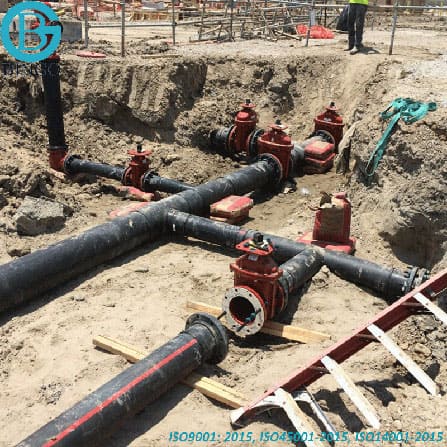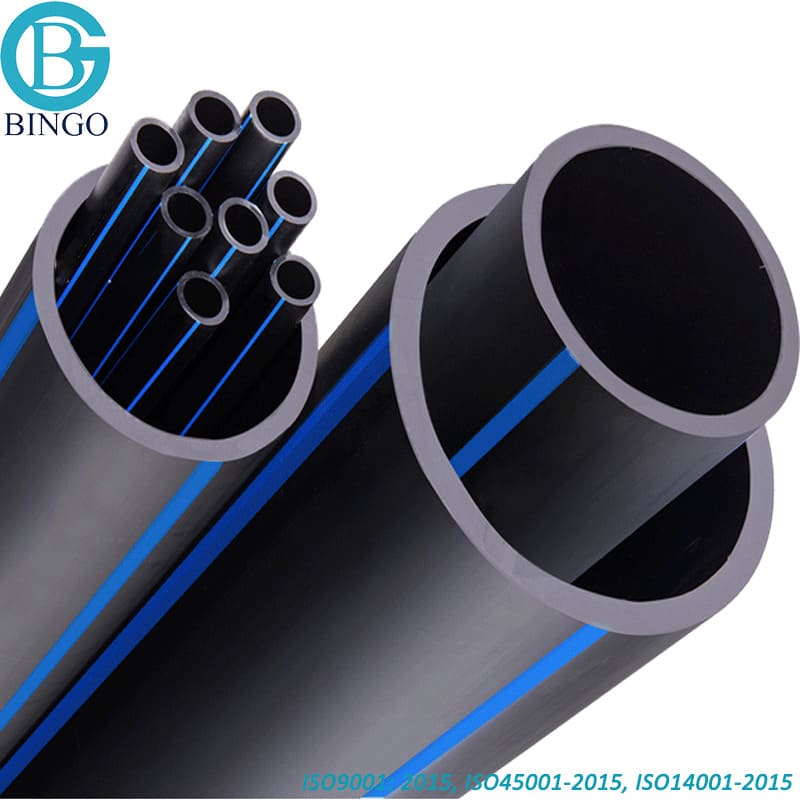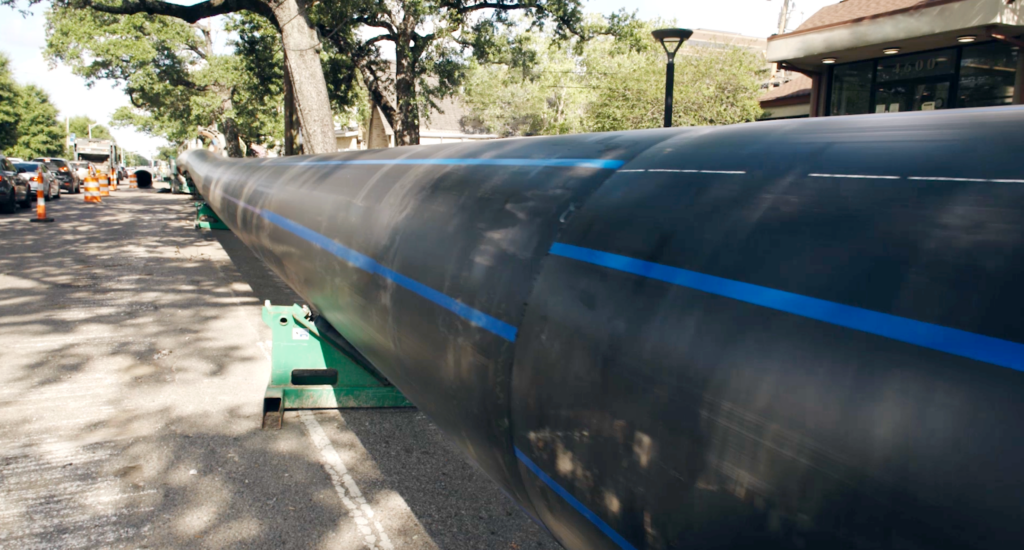Exploring the Leading Pipeline Manufacturers: Quality, Integrity, and Technology
The pipeline manufacturing industry stands at the junction of innovation, integrity, and top quality, driven by leading companies such as Tenaris and Vallourec. These suppliers are not just committed to generating high-performance products however are additionally introducing lasting methods that attend to contemporary ecological problems (HDPE Pipe Supplier). As we examine the requirements that specify excellence in pipeline options, it becomes evident that the landscape is swiftly progressing. What specific innovations are emerging, and exactly how are these advancements shaping the future of pipeline facilities? The solutions may redefine market criteria in methods that are not yet totally comprehended
Leading Manufacturers Introduction
In the domain name of pipeline manufacturing, numerous vital gamers arise as leaders, each contributing significantly to the market's landscape. Firms such as Tenaris, Vallourec, and JFE Steel have established themselves as frontrunners by constantly delivering top quality products that meet stringent market criteria. Tenaris, renowned for its ingenious solutions, concentrates on seamless and welded pipes, providing largely to the oil and gas sector. Vallourec, a French international, concentrates on the production of premium tubular solutions, stressing sustainability and progressed modern technology in its manufacturing procedures.
Similarly, JFE Steel, a major Japanese manufacturer, is recognized for its extensive range of steel pipes, specifically those used in energy and facilities projects. Their dedication to research study and development has actually enabled them to generate high-performance products that endure severe environmental conditions. Furthermore, business like U.S. Steel and National Oilwell Varco have broadened their market visibility by diversifying their product offerings and boosting operational effectiveness.
These leading manufacturers not just control the marketplace but also drive development within the industry, setting criteria for top quality and reliability that various other players aim to achieve. Their contributions are vital for fulfilling the increasing need for resilient and efficient pipeline services worldwide.
Standards for High Quality Evaluation
Quality evaluation in pipeline manufacturing pivots on 2 vital criteria: material sturdiness standards and manufacturing process efficiency. Making sure that materials fulfill rigorous toughness benchmarks is vital for the long life and dependability of pipes. Additionally, enhancing the manufacturing process can enhance productivity while preserving premium quality, inevitably affecting overall efficiency and safety and security.
Product Toughness Specifications
Guaranteeing the long life and integrity of pipeline products is essential for preserving framework stability and operational effectiveness. Material longevity criteria play an essential function in assessing the top quality of pipelines, determining the efficiency and life-span of the products utilized in building and construction. Manufacturers have to abide by an array of strenuous requirements, including those set by companies such as ASTM International and the American Petroleum Institute (API)
These criteria assess numerous aspects, consisting of corrosion resistance, tensile stamina, and fatigue performance. As an example, pipes made use of in corrosive settings call for materials that can stand up to chemical degradation, while those subjected to high-pressure problems need to exhibit outstanding tensile toughness.
Furthermore, factors such as temperature level variations and environmental problems should be considered, as these can considerably influence product behavior in time. Manufacturers frequently utilize sophisticated screening techniques, consisting of increased aging examinations, to replicate long-lasting wear and warranty that products go beyond or fulfill market benchmarks.
Manufacturing Process Efficiency
Manufacturers' ability to maximize manufacturing procedure effectiveness is crucial for generating top notch pipelines that satisfy rigid industry standards. Performance in manufacturing directly influences cost management, production timelines, and overall item stability. To achieve this, leading pipeline makers implement innovative techniques such as lean manufacturing, automation, and real-time data analytics.
Lean making principles are essential in minimizing waste and taking full advantage of resource utilization. By improving processes and eliminating redundancies, makers can improve performance while guaranteeing regular high quality. Automation modern technologies, consisting of robotics and computer system numerical control (CNC) equipments, play a critical duty in boosting precision and minimizing human error, thus raising the dependability of the last product.
Additionally, using real-time information analytics enables manufacturers to monitor manufacturing processes continuously, enabling them to identify traffic jams and make timely modifications. This proactive technique not only boosts effectiveness but likewise sustains high quality guarantee methods by ensuring conformity with regulatory standards.
Reliability in Pipeline Solutions
Integrity in pipeline remedies is paramount, as it straight affects the safety and effectiveness of liquid transport systems. Trick variables consist of the toughness of materials utilized, adherence to extensive testing and accreditation requirements, and the unification of ingenious product services that enhance performance. Comprehending these components is necessary for producers intending to supply dependable pipeline facilities.
Significance of Longevity
Attaining resilience in pipeline options is essential, as it straight influences the long-term performance and security of facilities. Durable pipes are necessary for lessening maintenance expenses and minimizing the likelihood of tragic failures. This integrity is particularly important in industries such as oil and gas, water supply, and wastewater administration, where the effects of pipeline failing can be serious, both financially and environmentally.
The materials and producing processes used by pipeline makers play a considerable function in figuring out the toughness of the final item. Using premium basic materials, advanced innovations, and cutting-edge style concepts guarantees that pipelines can withstand various stressors, including pressure changes, temperature variants, and destructive environments.
The durability of pipelines is carefully linked to their capability to resist exterior variables such as dirt movement, seismic task, and chemical direct exposures. Reliable corrosion security methods, such as finishes and cathodic security, further enhance the longevity of pipes, safeguarding them versus degeneration with time.
Spending in resilient pipeline options inevitably equates to boosted operational efficiency, lowered downtime, and boosted safety and security, attesting the vital importance of resilience in modern pipeline manufacturing.
Checking and Qualification Criteria
In the domain of pipeline solutions, extensive testing and certification standards are essential to assure the reliability and security of facilities. These requirements work as criteria for examining the efficiency and sturdiness of pipeline products and systems, validating they satisfy certain regulatory and industry needs.
Checking processes typically include numerous methodologies, including stress testing, hydrostatic analyses, and non-destructive testing techniques. These analyses are essential for identifying possible weak points or problems in the materials prior to they are deployed in real-world applications. Furthermore, accreditation by recognized companies warranties that manufacturers adhere to developed standards, which fosters trust among stakeholders, including contractors, end-users, and designers.
Lots of leading pipeline suppliers participate in continual tracking and improvement of their testing protocols to adapt to evolving sector standards and technical advancements. Compliance with criteria such as ASTM, ASME, and ISO not just improves item integrity yet also minimizes the danger of environmental events connected with pipeline failures.
Cutting-edge Product Solutions
The advancement of innovative material options has transformed the landscape of pipeline manufacturing, improving both performance and toughness. Advanced products such as high-density polyethylene (HDPE), cross-linked polyethylene (PEX), and composite products have become game-changers, offering exceptional resistance to deterioration, temperature changes, and pressure variants. These materials not just prolong the life expectancy of pipelines yet also minimize upkeep costs, making sure trusted long-term performance.
Manufacturers are progressively adopting wise products that include sensing units for real-time surveillance. This innovation permits proactive upkeep, considerably improving integrity by discovering leaks or structural weaknesses before they rise into important failings. The integration of nanotechnology has actually likewise resulted in the advancement of coatings that improve the toughness of pipes against abrasion and chemical direct exposure.
Sustainability is another vital emphasis, with producers discovering bio-based compounds and recyclable products that lessen ecological effect. As regulatory standards continue to evolve, the focus on innovative product solutions ends up being critical in conference strict security and ecological requirements. Inevitably, these developments not only boost the dependability of pipeline systems however likewise contribute to the general effectiveness and sustainability of energy transportation facilities.
Innovations in Pipeline Innovation
Technologies in pipeline technology are revolutionizing the sector by improving efficiency, safety, and ecological sustainability. Current advancements concentrate on clever pipeline systems that make use of sensors and IoT innovation to check conditions in genuine time, enabling aggressive maintenance and lowering the risk of failures. These systems can find leaks, pressure modifications, and various other anomalies, allowing for quick reaction and lessening environmental impact.
Furthermore, the growth of innovative products, such as composite and corrosion-resistant alloys, considerably expands the lifespan and reliability of pipes. Pipeline Manufacturer (Permian Basin HDPE Pipe Supplier). These materials lower upkeep prices and boost efficiency in harsh settings, making them optimal for water, oil, and gas transportation
Automation and robotics are playing an essential role in pipeline building and construction and inspection. Drones and robotic gadgets facilitate studies and assessments of hard-to-reach locations, guaranteeing extensive assessments without endangering safety and security.
Moreover, ingenious layouts, such as modular pipeline systems, permit higher flexibility in setup and modification, providing to the dynamic needs of the energy market. With each other, these technological improvements not only enhance operational effectiveness but likewise add to an extra sustainable and resistant pipeline infrastructure, leading the way for a greener future.
Case Studies of Success
Throughout different markets, successful executions of innovative pipeline modern technologies show substantial improvements in operational performance and security. One remarkable situation is the implementation of clever pipeline tracking systems in the oil and gas sector, where real-time information analytics have decreased leakage detection times by over 50%. This not just lessens environmental risks but likewise boosts the overall stability of pipeline facilities.

Furthermore, a major manufacturer executed robot inspection modern technologies in its pipeline upkeep operations, causing a 40% renovation in examination effectiveness. This technique has structured upkeep routines and significantly reduced downtime.
These case studies highlight exactly how prominent pipeline producers are leveraging innovative innovations to cultivate reliability and operational quality, eventually establishing brand-new criteria for the sector. As these successes continue to unravel, they lead the way for further advancements in pipeline manufacturing and administration.

Environmental Sustainability Practices
Often, pipeline producers are prioritizing environmental sustainability methods to minimize their ecological footprint and enhance the durability of their products. This dedication is shown in various initiatives aimed at lowering waste, preserving power, and utilizing sustainable products throughout the manufacturing process.

Several manufacturers are embracing sophisticated modern technologies that decrease emissions and energy consumption. The assimilation of automated systems and energy-efficient equipment aids enhance production while decreasing dependence on fossil fuels. Furthermore, business are significantly turning to environmentally friendly products, such as recycled steels and bioplastics, which not only decrease the ecological impact however additionally advertise a circular economy.
Pipeline manufacturers are executing extensive lifecycle evaluations to review the environmental ramifications of their items from inception to disposal. This method allows them to determine possibilities for enhancement and foster liable sourcing and waste monitoring techniques.
Cooperation with ecological organizations additionally boosts these efforts, as makers seek to straighten their procedures with worldwide sustainability goals. Inevitably, these environmental sustainability practices not only contribute to a healthier earth yet likewise setting makers as liable leaders in the sector, appealing to environmentally aware stakeholders and consumers alike.
Future Trends in Pipeline Manufacturing
As the need for a lot more reliable and sustainable framework expands, pipeline manufacturing is positioned for substantial improvements that will reshape the market. Trick patterns prepared for in the coming years include the assimilation of sophisticated materials, such American Plastics LLC HDPE Pipeline Manufacturer as composite and corrosion-resistant alloys, which improve toughness while reducing environmental impact. Manufacturers are additionally expected to adopt innovative manufacturing techniques, like additive manufacturing and automation, to streamline processes, lower waste, and lower expenses.
Furthermore, the rise of wise pipeline modern technologies, incorporating sensors and IoT gadgets, will allow real-time tracking and anticipating maintenance, thereby enhancing safety and security and functional efficiency. This electronic improvement will certainly not only enhance source management but also facilitate conformity with rigid ecological guidelines.
Sustainability will remain a main emphasis, driving manufacturers to invest in environment-friendly methods, including energy-efficient manufacturing techniques and reusing efforts. As the international emphasis on climate change magnifies, pipeline manufacturers will need to adapt by establishing remedies that satisfy both environmental and financial demands.
Frequently Asked Concerns

What Industries Mostly Use Pipeline Products From These Manufacturers?
Pipeline items are largely used in industries such as oil and wastewater, water and gas monitoring, chemical construction, processing, and mining. These markets count on reliable, sturdy, and risk-free transportation of products and fluids.
How Do Manufacturers Make Sure Conformity With International Pipeline Specifications?
Manufacturers assure compliance with international pipeline criteria by applying extensive quality assurance procedures, carrying out regular examinations, adhering to established governing frameworks, and purchasing worker training to promote understanding and understanding of safety and high quality demands.
What Is the Average Life Expectancy of Pipelines From Leading Manufacturers?
The typical lifespan of pipelines from leading makers usually ranges from 30 to 100 years, relying on product, environmental problems, and maintenance methods. HDPE Pipe Supplies Midland TX. Routine examinations and adherence to market criteria significantly influence long life and performance
Exist Certifications Certain to Pipeline Manufacturing High Quality?
Yes, various qualifications exist for pipeline manufacturing top quality, consisting of ISO 9001 for quality administration systems and API criteria certain to pipes. These qualifications ensure adherence to extensive safety and security, efficiency, and ecological standards within the sector.
Exactly How Do Manufacturers Manage Pipeline Upkeep and Repair Works?
Manufacturers typically carry out a proactive maintenance strategy that consists of routine assessments, keeping an eye on systems for very early discovery of problems, and a structured repair work method. This strategy guarantees pipeline stability, decreases downtime, and improves overall operational performance.
Quality assessment in pipeline manufacturing pivots on two crucial standards: product sturdiness requirements and producing procedure performance - Pipeline Manufacturer. Product longevity criteria play an important duty in assessing the high quality of pipes, determining the efficiency and lifespan of the materials made use of in building and construction. The materials and producing processes used by pipeline makers play a significant role in determining the toughness of the final item. The typical lifespan of pipes from leading makers typically varies from 30 to 100 years, depending on material, ecological conditions, and upkeep practices. Yes, various certifications exist for pipeline manufacturing high quality, consisting of ISO 9001 for top quality management systems and API standards certain to pipelines